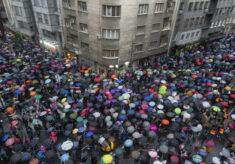The war in Ukraine got dangerously close to NATO borders in the Balkans in July, increasing the risk of a further escalation in Europe, after Russia used Iranian military drones to bomb harbour facilities at two important river ports on the Danube, few hundred meters from the Romanian border and not far from Moldova, another country that aspires to enter both EU and NATO.
At the end of July, Moscow employed several Iranian Shaheed-136 drones to bomb the Ukrainian ports of Reni and Izmail, on the Danube, demolishing warehouses and grain silos and damaging a cargo ship in Reni, while Izmail, downstream, escaped almost intact. The Romanian border is only over the river, and the Moldovan Danube port of Giurgiulesti is just five kilometres upstream, as is the Romanian city of Galati, which has a population of 220,000 people. It is only by chance that the Shahed drones, which are notoriously inaccurate, did not land on the NATO side of the border, media in Ukraine and Romania warned.
The attack on Reni and Izmail was part of the larger Russian effort to stifle Ukraine’s grain exports. Russia did not extend the so-called Black Sea grain deal last month, which was negotiated by Turkey and the United Nations last year and enabled Ukraine and Russia to transport billions of euros in grain and wheat over the Black Sea. Ukraine accounts for a significant share of the global food supply, including 10% of the global wheat market, 15% of the global corn market, and 13% of the barley market. After leaving the deal, Russia has unleashed attacks on grain supplies on the key Ukrainian port city of Odesa, wiping out 60.000 tons of grain.
Surprisingly, Moscow did not stop there, and decided to hit also the Danube ports, increasingly used by Kyiv to export grain avoiding the most dangerous parts of the Black Sea, the northern areas, since last spring. “To see Russian forces targeting Danube River ports and grain silos, it’s just chilling in the extreme,” said USAID Administrator Samantha Power. USAID and the EU were supporting Ukraine in developing the two Danube’s ports to export cereals abroad in the previous months.
After the attacks on the Danube, Romania – the closest NATO country – reacted with restraint, in order to avoid a further escalation, but fears of an escalation were evident. There was “no direct military threat to the national territory,” Bucharest’s Ministry of Defence stated, noting that “enhanced vigilance” was nonetheless introduced on the border areas with Ukraine. However, Romanian President Klaus Iohannis admitted that the attack on Ukrainian civilian infrastructure on the Danube, “very close to Romania,” poses a “serious security risks in the Black Sea. It also affects the continued transit of grain through Ukraine, and thus global food security.”
NATO reacted more boldly, after having discussed the “serious security situation in the Black Sea region following Russia’s unilateral termination of the Black Sea Grain.” The Alliance condemned “Moscow’s cynical drone attack on the Ukrainian grain storage facility in the Danube port city of Reni, very close to the Romanian border.” Furthermore, NATO countries noted that “Russia’s new warning area in the Black Sea, within Bulgaria’s exclusive economic zone, has created new risks for miscalculation and escalation, as well as serious impediments to freedom of navigation.” “Russia’s actions also pose substantial risks to the stability of the Black Sea region, which is of strategic importance to NATO (…) and we remain ready to defend every inch of Allied territory from any aggression,” NATO Secretary General Jens Stoltenberg said.
The first Russian attack on civilian targets close to NATO’s external border in a region without significant military infrastructure could be just the starting point of a further escalation that might involve Romania, Bulgaria, but also Moldova, with potentially destabilising and dangerous effects on the wider Balkan region and on Europe in general. Nonetheless, Romania assured Ukraine that Bucharest will work on intensifying the transport of Ukrainian grain through Romania and assist in potentiating the cargo traffic on Danube.

















